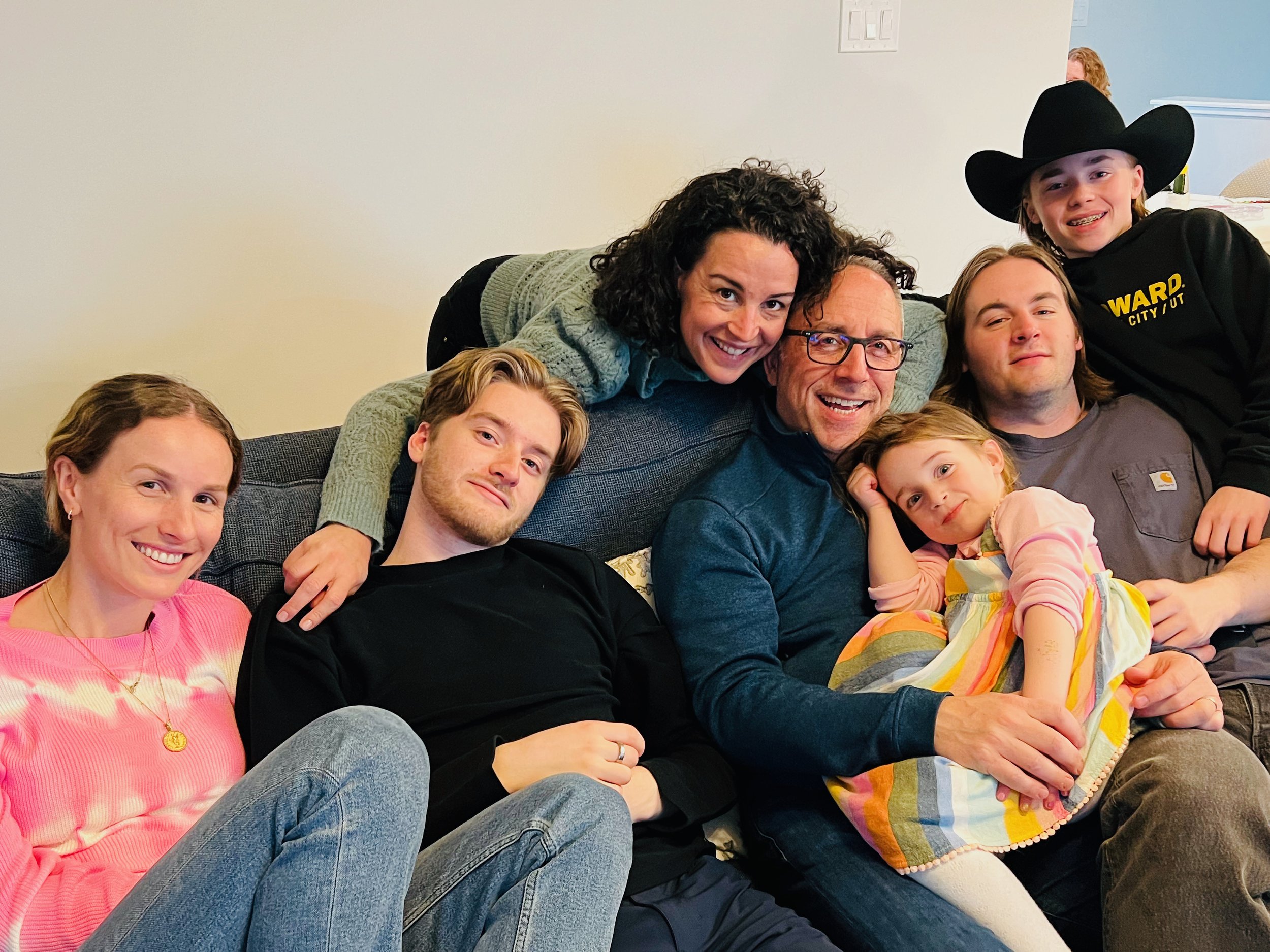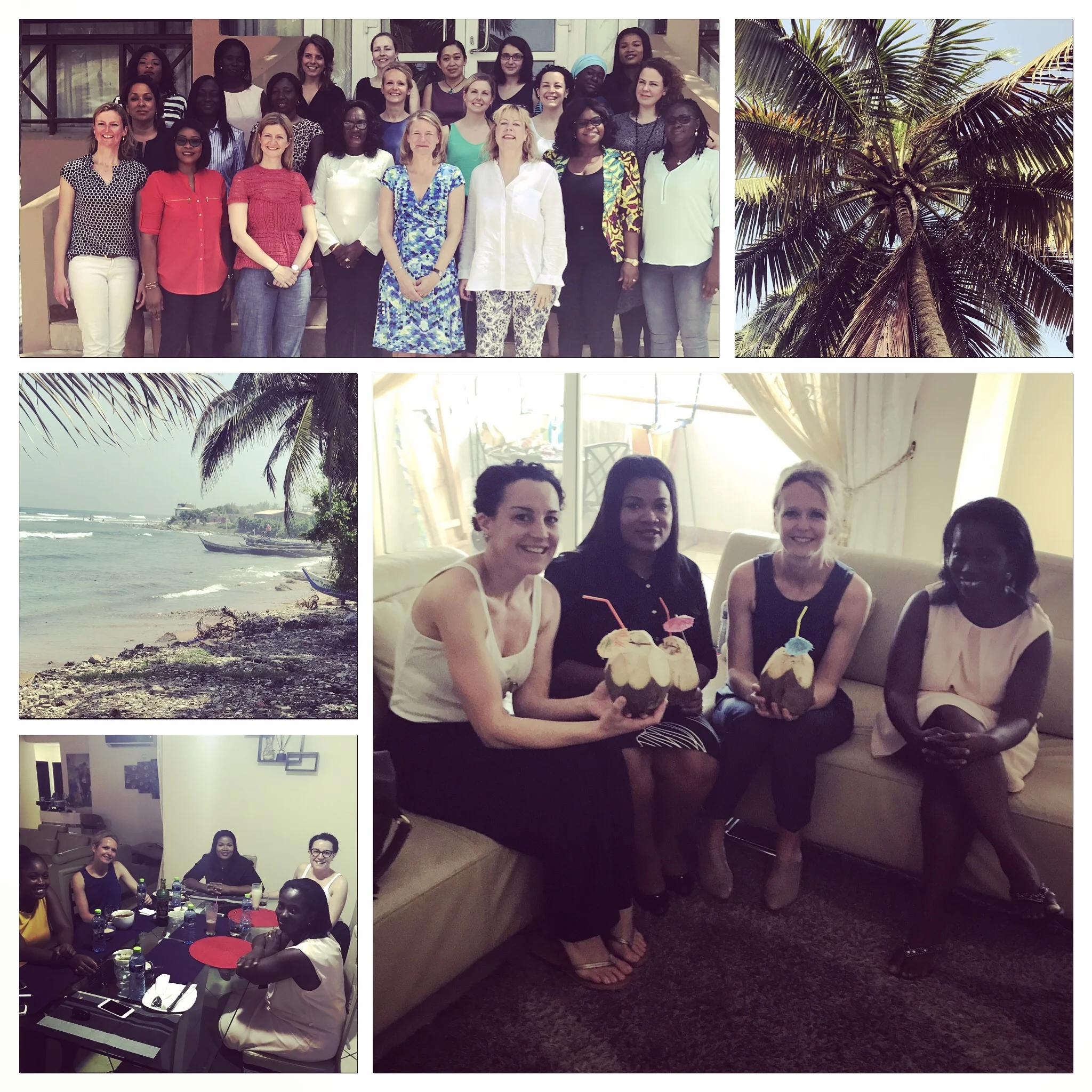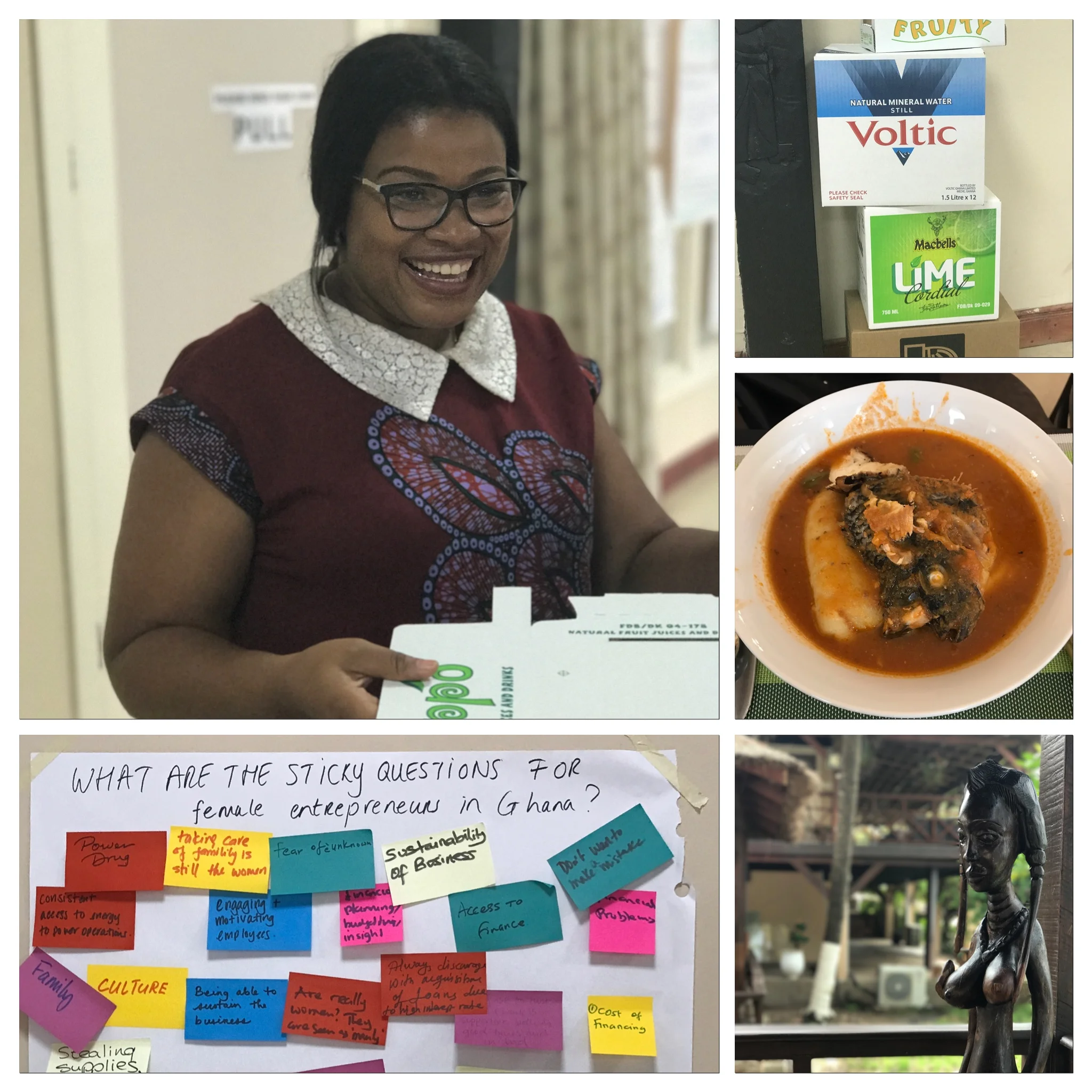Accra, Day 4. Midunu House.
Thursday May 10, 2017.
Last night in Accra… and, we were in a magical place. Midunu roughly translated means “come, let’s eat.” Selassie Atadika was our host. After growing up in New York and traveling around the continent while working in the UN for over a decade, she returned to Ghana and turned what is actually her family home into Midunu House, where she lives her passion for food. To celebrate its culinary heritage, she hosts various events featuring African cuisine. Tonight we sampled delights from East, West and South Africa. She was an absolute force, keeping the whole evening flowing in her dramatic long pink dress and white pants, directing an attentive and hard-working staff, and engaging readily with everyone, including while selling her delicious chocolates. Since the world is small, it so happens that a former GS colleague was there, Jacey, who contributed to Katie’s research on Closing the Credit Gap, and she pointed out (after I finally stopped hugging her and she could actually speak) that “here, everyone is selling something, everyone’s an entrepreneur.” And, of course, in her insightful way, she’s totally right.
The afternoon at Midunu consisted of a “pitch panel,” where our entrepreneurs had the opportunity to tell their story, articulating both their achievements to date and their challenges as they look forward — and most importantly, what they need to realize the opportunities in front of them, and ultimately, their dreams. The panel consisted of local leaders: Patricia Safo, a serial entrepreneur and impact investor in Ghana, Dalapo Ogundimo, who oversees the Africa region for Access Bank, and Maureen Odoi, who founded an enterprise development organization, providing business advisory and training to over 10,000 start-ups in Africa.
During the morning, we prepped: two of our four entrepreneurs said they couldn’t do the pitch. During the evening, we celebrated: all four ladies told their stories, and they shined.
As we prepped with Emelia, helping her think through how to craft this story, the idea of doing an interview came up and she said “yes that is what we’ll do; Maggie, you’ll ask me questions.” I knew this format gave her comfort and the ability to think clearly about the message she wanted to organize, and deliver. So we talked through 3 questions, I explained everything I have learned from all the people I’ve watched and learned from, and we had a plan. She asked for some quiet time to reflect, after we had practiced and gone through the content, and of course we didn’t blame her for needing a break from all the “international direction” she was receiving :)
So that afternoon, we filled up the room in Midunu, fans swirling, heat from the lights and the humid afternoon all around… and the stories began. Helena, Joana, Gladys… there is an intensity in the room that is hard to describe; everyone is not only emotional but also hard at work and thinking through so much. After what seems like a long time, Emelia is invited up. She rises from her chair and I start to follow her, but the room is tightly packed and before I even realize it, as I’m halfway across the room, she has begun her pitch! For a second I think she is making a sort of “long” introduction, but I quickly realize she’s DOING THIS. As I write this, I am alone in my hotel room smiling the biggest smile, just like I was at that moment. My Dutch teammates and I make eye contact and I realize we are all BEAMING in the same way: eyes wide, and smiles even wider.
Emelia continues, she tells the story of how her father came to the City aged 25, had her aged 26, and by the time she was 9, had founded Kasapreko — at the time, just “a couple of bottles in the garage.” Though their home didn’t have a proper floor and they slept on mats, he worked hard enough to send her to the best schools. And she lived under his tutelage as he grew Kasapreko, knowing early that it was her duty to carry on his legacy and be in this family business. And she does. Emelia then speaks to the success of Royal Crown Packaging. Last year, their first year in operations, the team generated annual revenue of 30 million cedis (roughly 8m USD) and she is proud to share that in Q1 of this year they have generated 22m alone. They have gained share and now are “neck and neck” with the market leader, who has been operating for the last 30 years. They have hired 75 people and provided training to help them grow. Some of her employees were temporary workers at Kasapreko and now she sees them operating heavy machines in her factory, earning a stable income and supporting their families. You can see how much this means to Emelia as she speaks about it. Her employees are an extension of her family, they are her brand, her people, and her passion.
At dinner, we learn more about the Ghanaian economy, the recent changes and challenges, the reasons banks are hesitant to lend, and the struggles that businesses of all shapes and sizes are facing in this environment. It begins to knit together, and I see the outline of a picture emerging in my head, while I feel a clarity in my heart, and a sense of connection and belonging in my gut. As Access Bank Board NED Abena Amoah says to me: "this is a place where everyone feels like an old friend." I know I will be back here, I know I have made connections for life, I realize that this moment is one I will not ever forget. And while earlier in the week I felt small in something that was bigger than me, overcome in some way… this night instead, having seen the growth our four brave women (and everyone around them) have achieved this week, I feel grounded, and overjoyed, filled only with pride, peace, and gratitude.
Thank you for sharing in this experience with me these past few days. There is much more to come….
With gratitude for being trusted in this experience,
Maggie




